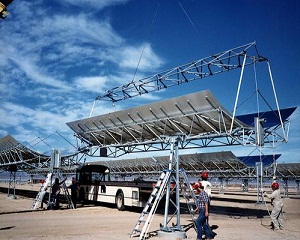Economist argues against renewable energy
 The American Enterprise Institute is hosting a point and counterpoint debate about the virtues of widespread implementation of renewable energy generation.
The American Enterprise Institute is hosting a point and counterpoint debate about the virtues of widespread implementation of renewable energy generation.
The title of the event is Clean, Green, Renewable: What Could Go Wrong?
There is broad support across the political spectrum for implementing renewable energy generation like wind and solar energy facilities. Some support it because of environmental impacts, others argue for it based on gaining energy independence from the Middle East and minimizing terrorist encounters and threats.
But two scholars argue against the paradigm.
Timothy Considine, a professor at the University of Wyoming, and Benjamin Zycher, will argue against renewable energy adoption with Jimmy Glotfelty of Clean Line Energy and Kate Gordon from the Center for American Progress.
“I don’t think they’re going to say anything I haven’t already heard,” Zycher said. “But we’ll see.”
Zycher, an economist, said he’s long believed that policies that subsidize renewable energy are misguided and will lead to economic disadvantages.
“And I found the conversation in the political realm dismal,” he said.
He had trouble finding anyone who offered a critical analysis of the dangers of investing in new energy technologies, which is why he pursued the research and wrote the book Renewable Electricity Generation: Economic Analysis and Outlook.
His book hinges on three main arguments—that renewable electricity has several inherent problems, the arguments in favor of widespread renewable energy adoption are flawed and the natural gas market will erode the competitiveness of renewable energy.
Zycher argues in his book that solar is not the youthful industry it says it is and that technology has already had time to advance and drop in price, but it hasn’t. He writes that increasingly unfavorable sites have driven wind costs up from $1.3 million per megawatt in 2001 to $2.1 million in 2009 and that solar costs rose 63 percent in the same timeframe.
He also argues that the subsidies for other traditional energy sources are tiny fractions of the subsidies offered for solar and wind generation, which makes them unsustainable.
Zycher said he hasn’t heard a lot of reaction about his book because it was just published in late December and is just now being disseminated. But he’s prepared for the response to be critical.
“I wanted to put together a relevant analysis that weighed out the issues,” Zycher said.



